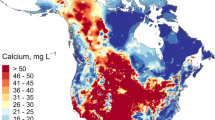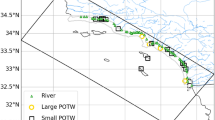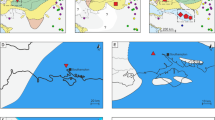Abstract
DURING investigations on the autecology of some mire carices, it was necessary to prepare a range of culture solutions with widely varying calcium contents. The culture solution used was full-strength Long Ashton basic formula1, minus the calcium nitrate, bulked with the required quantities of either calcium chloride or calcium nitrate. On measuring the pH of the resultant solutions (see Table 1) the fallaciousness of the term ‘base rich’, as applied to natural waters by ecologists, was made1 painfully obvious. We had indeed produced what ecologically would have been termed a base rich water with a remarkably low pH, a paradox, be it in ecological or chemical terminology.
This is a preview of subscription content, access via your institution
Access options
Subscribe to this journal
Receive 51 print issues and online access
$199.00 per year
only $3.90 per issue
Buy this article
- Purchase on SpringerLink
- Instant access to the full article PDF.
USD 39.95
Prices may be subject to local taxes which are calculated during checkout
Similar content being viewed by others
References
Hewitt, J., Sand and Water Culture Methods, Commonwealth Agric. Bur. Tech. Comm., 22 (1952).
Robinson, J. R., Fundamentals of Acid-Base Regulation (Blackwell, 1962).
Bell, R. P., Acids and Bases. Their Quantitative Behaviour (Methuen, London, 1952).
Bellamy, D. J., Przeglad Geog., 34 (1962).
Author information
Authors and Affiliations
Rights and permissions
About this article
Cite this article
BELLAMY, D., RIELEY, J. Use of the Term ‘Base Rich’ in Ecology. Nature 201, 946 (1964). https://doi.org/10.1038/201946a0
Issue date:
DOI: https://doi.org/10.1038/201946a0



